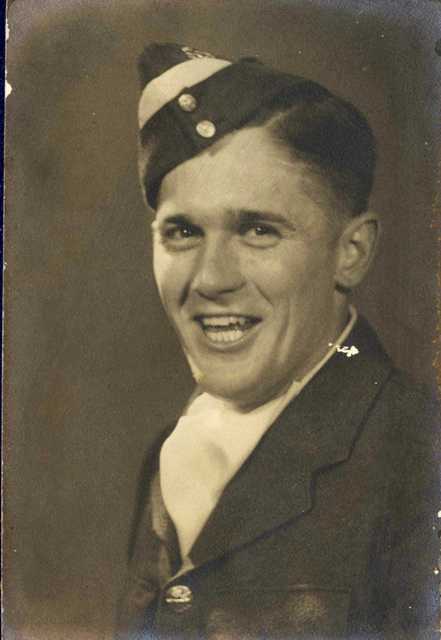 He grew up in the Sunday school in his church, went through
the city primary school and graduated from the Walter Bickett
High School in 1937. Then he went to Clemson College, the South
Carolina State school, and studied for two years.
He grew up in the Sunday school in his church, went through
the city primary school and graduated from the Walter Bickett
High School in 1937. Then he went to Clemson College, the South
Carolina State school, and studied for two years.Frank Howie Sutton
For Whom Camp Sutton, N.C. Was Named
Frank Howie Sutton, son of George Franklin and Pattie Sutton, was born July 15, 1917. He was killed while on duty with the Royal Canadian Air Force in North Africa, December 7th, 1941. He is survived by his mother, one sister, and three brothers, one of whom is now in the air service of the United States.
 He grew up in the Sunday school in his church, went through
the city primary school and graduated from the Walter Bickett
High School in 1937. Then he went to Clemson College, the South
Carolina State school, and studied for two years.
He grew up in the Sunday school in his church, went through
the city primary school and graduated from the Walter Bickett
High School in 1937. Then he went to Clemson College, the South
Carolina State school, and studied for two years.
Coming home to begin his life work, he became interested in flying at the local field at Monroe, and early in 1940 he became a cadet in the United States Air Corps, and received his first training in Tuscaloosa, Alabama. From there he went to Randolph Field. In August, 1940, and on his own responsibility, impelled by the desire to see active service, he went to Canada and made application for the Royal Air mForce, and was accepted. After several months of in tensive training he was sent to England and arrived there about April, 1941.
His first service was as test pilot. Then he went into the coast patrol and active duty in Northern Ireland. He was an associate of that body of men of whom Winston Churchill said, "Never did so many owe so much to so few." From there he was sent to Northern Africa. Just when and where, the censorship prevented us from knowing. On December 7th, 1941, he was killed in action, and was buried by the Australian Infantry near Tobruk.
He died on the very same day that some three thousand of his American comrades in arms were slain at Pearl Harbor. Born at the very time American boys were going against the enemy in the first world war, he died on the day that we entered the second world war, which was but a continuation of the first. He died as much in the service of America as our other boys will now die. He was in fact our first casualty. Some day we shall know the full story of how he died and his body will no doubt be brought home to rest forever in his native land.
We honor him today as the first of our brave youths who have given their lives that Americans may remain free and decent.
What consolation can we offer his loved ones? The consolation that his brief life was one of energy and happiness, and his death a brave and glorious one. He died in the manner that brave men have always died. The blood of such men has always fertilized the fileds upon which liberty was planted, and by their deeds it has lived on in the world. In religious history it has been said that "the blood of the martyrs has been the seed of the church." In civil and political history so true it is that men have always had to fight for its maintenance that a great English statesman said many years ago that liberty, in the last analysis, is but the blood of the brave.
Frank Sutton was a typically pure-hearted and valiant American boy. He died in the heritage of the brave and good people who, like him, in their day and time never hesitated to live according to the duties of his hour. Monroe has known his people on both sides for five generations, including both his great grandfathers. They would have been proud of him, as his living relatives are proud of him. Of such men who die for their country it has always been said:
"On fame’s eternal camping ground
Their silent tents are spread,
And memory guards in solemn round
The bivouac of the dead."
"Camp Sutton was named by the War Department on February 9th, 1942, and published in W.D. General Orders Number 10, dated February 24th, 1942."
By order of Colonel Wheeler`
Return to The Gold Star Mothers Homepage
Every effort was made by the Reference Staff of the Union County Public Library to keep the integrity of the original scrapbook. Spelling and grammar were NOT altered from their original form. Layout was altered to accomodate the Internet format.